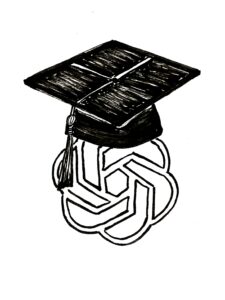

It is not a secret that technology can be scary. Is this reductive? Perhaps. But it truly can be an unsettling prospect to consider how far and fast we have advanced technologically. To see how removed we can make ourselves from the discomfort and inconvenience of living can be to see how far we remove ourselves from the discomforts and inconveniences of living.
Artificial intelligence (AI) sparks this fear in us like little else. To imagine a computer thinking like we might rankles our sensibilities, and it frightens us to think what that computer could be capable of in our stead.
The Luddites understood the risks of technology. Arising out of the working class of garment manufacturers in the Industrial Revolution, this movement of anti-technology was in many ways a recognition of the capacity for technology to be used to replace the working man. By smashing manufacturing machines and destroying symbols of progress, the Luddites cemented their commonly understood place in history as those who feared technology.
I make no claim that our professors fear something like ChatGPT. I doubt that, at least in the forefront of their minds, it is little more than a frustration that their students may decide doing one’s own work is no longer worth it, with a far easier option at their fingertips. But why have we assumed that AI is only a tool for cheating? What about it made us overlook its potential as a tool to improve us in academia, outside of the classrooms of computer science?
I would argue that a greater comparison could be drawn between The Luddites resentment of our interaction with technology with their potential capabilities and our professors. After all, an individual with a unique and carefully honed skill set attempting to pass it on to the next generation would rightfully see the incursion on that process as insulting and denigrating to their work.
My argument is not that professors should allow students to turn in plagiarized work so that they can avoid accusations of Luddism. Consigning ChatGPT to be a cheating tool and nothing more allows resentment to cloud creativity. And creativity, at its finest, brings out the potential in all things.
But what if technology destroys writing? I would argue that if used creatively, it could enhance our abilities. This would not be the first art form to fear advancement as being potential destruction. Art has survived technology before — take this example.
“Giant Steps,” by John Coltrane, features Art Taylor playing drums as part of what has been described as one of the most feared compositions in jazz. Its tempo and variety are incredibly difficult for a musician to master, and yet in spite of its mastery it sounds distinctly human.
In contrast, the sounds of New Order’s “Blue Monday” come not from an individual playing drums but from a drum machine. The track has none of the room for human imperfection that “Giant Steps” does. Instead, it creates a wholly unique product that has been lauded as one of the greatest club tracks of all time.
“Giant Steps” could, theoretically, be programmed into a drum machine. Art Taylor could be taught the repetitive rhythms of Blue Monday. But why would one do that? Each artist used their own unique tools and techniques to create the art that they felt compelled to create. They were given access to tools, and with those tools they made enduring classics that sound completely different from each other that were both allowed to occupy places of honor in the canon of modern music. That is a good thing.
The average student may never produce the academic paper equivalent of a song ranked among Rolling Stone’s “Greatest Of All Time.” That does not mean they should not be given a choice of tools in pursuit of the papers they will write. Whether they want their “drumsticks” or their “drum machine,” they are going to need something. Teach them how best to use it. There must be positive uses for AI in academic writing. How are we to find them if we do not begin to look? We can be better than our fears and our disdain, and incorporate all tools available to better suit the unique students that populate our halls.
I urge my professors — the more you keep hammering into our heads that ChatGPT is only good to cheat with, the stronger the association will grow. It is not too late to start using AI as a tool for learning.
Unlike the music industry, which is famously resistant to new technology until it is overwhelmed by it, we in academia could do what we are here to do and learn from this. When we begin to be creative, we make the tools of the future our own.
Subscribe to the Mossy Log Newsletter
Stay up to date with the goings-on at Lewis & Clark! Get the top stories or your favorite section delivered to your inbox whenever we release a new issue.

Leave a Reply